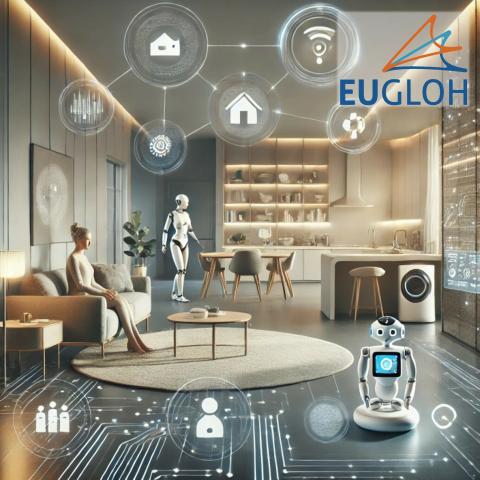
Doctorate School of Engineering: Smart systems for Ambient Assisted Living
This school focuses on Smart Systems for Ambient Assisted Living. It will cover advanced topics related to utilizing technology to enhance the quality of life for elderly or disabled individuals within their living environments. These systems often integrate sensors, actuators, artificial intelligence, and communication technologies to monitor and assist with daily activities, health monitoring, and safety. The school will include lectures covering various aspects such as sensor technologies, data analysis techniques, machine learning algorithms, human-computer interaction, privacy and ethics considerations, and real-world implementation challenges. PhD students will have the opportunity to demonstrate the progress they are making in their doctoral thesis.
Participants, typically PhD students and researchers, will have the opportunity to learn from leading experts in the field, exchange ideas, and collaborate on innovative research projects aimed at improving the design, development, and deployment of smart systems for ambient assisted living.
The course will use a conference format with lectures (blended), oral presentations (blended), poster session (onsite) and discussion sessions (onsite). Participants must specify their preference for an oral (online/onsite) or poster presentation in the abstract submitted during the application process, and thus to participate in all activities of the conference, or be limited to an online attendance. The maximum length of the abstract will be 1 page, including the title and keywords.
The Organizing Committee will organize the program based on the number of participants registered in each modality.
The course will use a seminar format with lectures, and discussion activities including students’ own research questions.
Key competencies developed by the activity:
Critical thinking: Develop your ability to engage in reflective reasoning and independent thinking. Analyze available facts, evidence, observations, and arguments to form a judgment.
Ethics & Responsability: Mature your capacity to reflect critically about moral values and direct your actions accordingly. Commit to behave responsibly and contribute to society's development and well-being.
Leadership & Social Impact: Acquire the ability to inspire and engage everyone around you. Get the support you need, through effective communication, persuasion, negotiation, and leadership. Seek opportunities for self-empowerment and for participatory citizenship.
Intercultural Skills: Explore how to benefit from the added value of diversity. Be able to create an inclusive environment in order to work and communicate effectively across cultures.
Creativity & Problem solving: Learn how to develop new ideas and opportunities to solve both new and old challenges.
UAH - University of AlcaláThis school focuses on Smart Systems for Ambient Assisted Living. It will cover advanced topics related to utilizing technology to enhance the quality of life for elderly or disabled individuals within their living environments. These systems often integrate sensors, actuators, artificial intelligence, and communication technologies to monitor and assist with daily activities, health monitoring, and safety. The school will include lectures covering various aspects such as sensor technologies, data analysis techniques, machine learning algorithms, human-computer interaction, privacy and ethics considerations, and real-world implementation challenges. PhD students will have the opportunity to demonstrate the progress they are making in their doctoral thesis.
Participants, typically PhD students and researchers, will have the opportunity to learn from leading experts in the field, exchange ideas, and collaborate on innovative research projects aimed at improving the design, development, and deployment of smart systems for ambient assisted living.
The course will use a conference format with lectures (blended), oral presentations (blended), poster session (onsite) and discussion sessions (onsite). Participants must specify their preference for an oral (online/onsite) or poster presentation in the abstract submitted during the application process, and thus to participate in all activities of the conference, or be limited to an online attendance. The maximum length of the abstract will be 1 page, including the title and keywords.
The Organizing Committee will organize the program based on the number of participants registered in each modality.
The course will use a seminar format with lectures, and discussion activities including students’ own research questions.
Key competencies developed by the activity:
Critical thinking: Develop your ability to engage in reflective reasoning and independent thinking. Analyze available facts, evidence, observations, and arguments to form a judgment.
Ethics & Responsability: Mature your capacity to reflect critically about moral values and direct your actions accordingly. Commit to behave responsibly and contribute to society's development and well-being.
Leadership & Social Impact: Acquire the ability to inspire and engage everyone around you. Get the support you need, through effective communication, persuasion, negotiation, and leadership. Seek opportunities for self-empowerment and for participatory citizenship.
Intercultural Skills: Explore how to benefit from the added value of diversity. Be able to create an inclusive environment in order to work and communicate effectively across cultures.
Creativity & Problem solving: Learn how to develop new ideas and opportunities to solve both new and old challenges.
